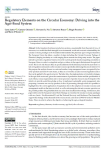Zarbà C., Chinnici G., La Via G., Bracco S., Pecorino B., D'Amico M. (2021). Regulatory elements on the circular economy: driving into the agri-food system. Sustainability, 01/08/2021, vol. 13, n. 15, p. 1-22.
https://doi.org/10.3390/su13158350
https://doi.org/10.3390/su13158350
| Titre : | Regulatory elements on the circular economy: driving into the agri-food system (2021) |
| Auteurs : | C. Zarbà ; G. Chinnici ; G. La Via ; S. Bracco ; B. Pecorino ; M. D'Amico |
| Type de document : | Article |
| Dans : | Sustainability (vol. 13, n. 15, August 2021) |
| Article en page(s) : | p. 1-22 |
| Langues : | Anglais |
| Langues du résumé : | Anglais |
| Catégories : |
Catégories principales 10 - INDUSTRIES ; 10.2 - IAA (en général)Thésaurus IAMM ECONOMIE CIRCULAIRE ; SYSTEME AGROALIMENTAIRE ; HUILE D'OLIVE ; TRANSITION AGROECOLOGIQUE ; REGLEMENTATION ; GESTION DES DECHETS ; COVID-19 ; SOUS PRODUIT D'HUILERIE ; UNION EUROPEENNE ; ITALIE |
| Résumé : | In the transition from linear production systems, unsustainable from the point of view of resources, to a model that finds strength in environmental, social and economic sustainability, the circular economy paradigm is the foundation that facilitates the planetary agro-ecological transition. The European Union has taken a number of steps (including the Circular Economy Package of Directives) shaping circularity as a wide-ranging driver measure involving many sectors. The paper intends to provide a regulatory framework on the current general situation regarding circularity in European Union, in order to extrapolate and give evidence to the aspects that intersect the agri-food sector. This is not only because they are poorly addressed in the literature, but also because there is a lack of regulatory instruments on the circular economy specifically addressing this area of interest. For this purpose, the analysis focuses on waste and residue/scrap management issues, recognized by law as by-products and end-of-waste status, as they are covered by circular economy legislation and as they can be applied to the agri-food sector. The latter allow the implementation of circularity strategies in the agri-food sector and, given the numerousness of production chains and the peculiarities of each of them, various regeneration and/or reuse processes of specific resources may be depicted. The intent is to provide useful knowledge on how to implement sustainable waste management, also proposing a concrete case on a by-product of olive oil processing, through which it is possible to highlight how the correct application of regulations favors the adoption of circular economic and management models in the firms involved, as well as informing the relevant economic operators on the possible profiles of legal liability that may arise from insufficient knowledge. Furthermore, this paper delves into the European Green Deal’s Strategy as it enriches the circular economy paradigm with new facets. NextGenerationEU and the National Recovery and Resilience Plan financially support this strategy in the aftermath of the socioeconomic crisis from COVID-19 in the EU Member States. This is in order to achieve the objective of achieving the agro-ecological transition. |
| Cote : | En ligne |
| URL / DOI : | https://doi.org/10.3390/su13158350 |







